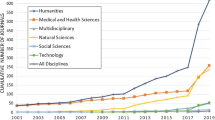Abstract
Justifying ethical practices is no easy task. This paper considers moral justifications for peer review so as to persuade even the sceptical individualist. Two avenues provide a foundation for that justification: self-interest (the right behaviour is that which maximally serves one’s own interests) and social contract theory (the right behaviour is that which best meets obligations set in binding social contracts). A wider notion of “interest” permits the self-interest approach to justify not only submitting one’s own work to peer review but also removing oneself momentarily from the production of primary knowledge to serve as a rigorous, independent, and honest referee. The contract approach offers a non-selfish alternative and relies on four types of binding social contracts: those implicit in accepting funds, those implicit in asserted professional status, those to contribute what is of most value to society, and those to defend the ideals of the Academy. Efforts to restore respect for rigorous, independent, honest peer review should begin in earnest.
Similar content being viewed by others
References
Rachels, J. (1993) The Elements of Moral Philosophy, 2nd ed., McGraw Hill, New York.
Thomson, A. (1996) Critical Reasoning: A Practical Guide, Routledge, New York.
Kohler, R. (1994) Lords of the Fly: Drosophila Genetics and the Experimental Control of Life, University of Chicago Press, Chicago.
Harcum, E. and Rosen, E. (1993) The Gatekeepers of Psychology: Evaluation of Peer Review by Case History, Praeger, Westport, CT.
Traweek, S. (1988) Beamtimes and Lifetimes: the World of High energy Physicists, Harvard University Press, Cambridge, MA.
Hull, D. (1988) Science as a Process: An Evolutionary Account of the Social and Conceptual Development of Science, University of Chicago Press, Chicago.
Rudwick, M.J.S. (1985) The Great Devonian Controversy: The Shaping of Knowledge among Gentlemanly Specialists, University of Chicago Press, Chicago.
Stewart, W. and Feder, N. (1987) The Integrity of the Scientific Literature. Nature 325 (15 January): 207–214.
Resnik, D. (1998), The Ethics of Science, Routledge, New York.
Stamps III, A. E., editor. (1997) Advances in Peer Review Research, special issue of Science and Engineering Ethics 3(1): 3–98.
Speek, B., ed. (1993) Publication Peer Review: An Annotated Bibliography, Greenwood Press, Westport, CT.
Chubin, D. (1990) Peerless Science: Peer Review and US Science Policy, SUNY Press, Albany, NY.
Sober, E. (1993) Philosophy of Biology, Westview, Boulder, CO.
Rousseau, J.-J. (1762) The Social Contract, translated by M. Cranston (1968), Penguin Books, New York.
Krohn, W. and Layton, E., eds. (1978) The Dynamics of Science and Technology: Social Values, Technical Norms, and Scientific Criteria in the Development of Knowledge, D. Reidel, Dordrecht.
Layton, E. (1971) The Revolt of the Engineers: Social Responsibility and the American Engineering Profession, Press of the Case Western Reserve University, Cleveland, OH.
Author information
Authors and Affiliations
Corresponding author
Rights and permissions
About this article
Cite this article
Cain, J. Why be my colleague’s keeper? Moral justifications for peer review. SCI ENG ETHICS 5, 531–540 (1999). https://doi.org/10.1007/s11948-999-0053-2
Received:
Revised:
Accepted:
Issue Date:
DOI: https://doi.org/10.1007/s11948-999-0053-2




